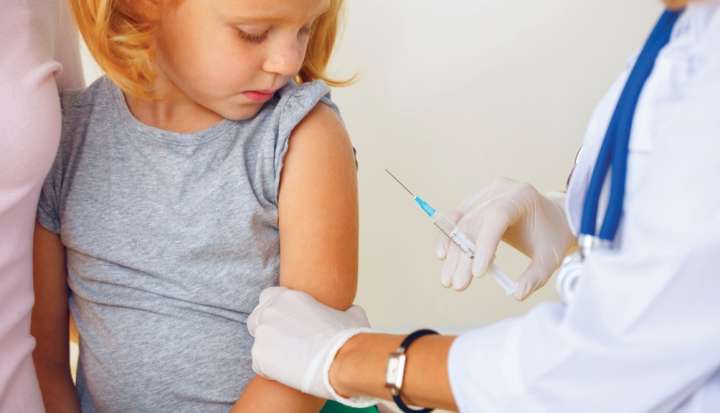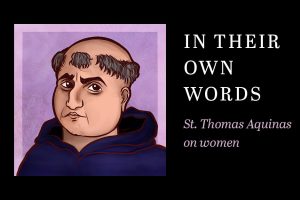I was recently asked whether Catholic schools are morally obliged to require vaccination. My answer is a resounding “Yes.” Catholic and, indeed, all Christian theology is based on the words of Christ, who said the second greatest commandment is, “You shall love your neighbor as yourself” (Matt. 22:39). It is right and proper to protect children against infection through vaccination.
I am not a disinterested observer. My brother died of polio, almost 10 years before the Salk vaccine became available in 1955. Most of my professional career has been spent in the clinical development of vaccines for children and adults, and I have cared for children suffering from vaccine preventable illnesses in my work as a pediatric infectious diseases physician.
If we are to love our neighbors as we love ourselves, we should certainly vaccinate to prevent illness in healthy children—and to protect children who cannot be vaccinated for medical reasons. The healthy family protects the entire community, a community that includes both those too young and too old to receive vaccinations.
We show brotherly love by building a larger and larger group of vaccinated individuals who ultimately serve to prevent the spread of infection within the community. What is known as “herd immunity” is a practical way to love our neighbors.
In the past, Americans were enthusiastic about vaccines preventing serious or fatal illness. A good example of this is the intense interest that Dr. Jonas Salk received regarding his work on the polio vaccine. The March of Dimes campaign supported his work, and it was estimated that two thirds of Americans contributed to this endeavor.
Parents in the 1940s and 1950s, when I was growing up, lived in fear of late summer when polio epidemics swept the country. Through relatives or acquaintances, all families were touched by the scourge of polio. My brother was stricken with polio and I can still see the terror in my mother’s eyes as she waited for our doctor to make a house call and confirm what she most feared.
President Franklin D. Roosevelt, himself paralyzed by polio in 1921, vigorously supported the March of Dimes annual fund drive. By 1953 the country had been mobilized to defeat polio, with more than 1.3 million children participating in what has been described as the largest vaccine trial ever. When the highly successful results were announced in April 1954, all major news networks covered the story live.
Development of vaccines is considered humanity’s greatest public health triumph. A recent study estimated that since 1924 more than 100 million cases of childhood diseases have been prevented by vaccination programs in the United States. Improved sanitation, better nutrition, and access to pure water have also helped, but it was only after mandatory vaccination laws that the rate of childhood infections dropped dramatically or all but disappeared.
Attempts to prevent disease go back thousands of years. As an example, smallpox, because of its characteristic rash, was well-known for centuries to be a cause of serious illness, scarring, and death. Variolation, the inoculation of dried material from smallpox scabs into the skin of children and adults, was practiced as early as the 1100s as a method to prevent the disease. Occasionally this non-standardized method of inoculation caused severe illness or death, but smallpox was such a dreaded disease people were willing to take the risk to protect their families.
But parents of young children today live in a time when many childhood illnesses have been eliminated or significantly reduced in occurrence thanks to vaccination. These parents will not experience the tragedy of polio, diphtheria, smallpox, pertussis, measles, mumps, or rubella.
We are victims of our own success, and because parents haven’t experienced suffering from these illnesses, some doubt the importance of vaccines. Parents have an obligation to their children to base decisions about vaccines on scientific research and not rumor, forwarded emails, or Hollywood nonsense.
For a period of time in the 1970s the DPT (diphtheria, pertussis, and tetanus) vaccine was thought to cause a neurologic disorder in infants. The association seemed obvious: The DPT vaccine was first given to infants at 2, 4, and 6 months of age, the time when this neurologic disorder presented. Eventually, careful scientific studies done in Britain and the United States by reputable clinicians established that the onset of serious neurologic disease was the same in vaccinated and unvaccinated groups of infants. However, these studies took years to complete, and the controversy about the DPT vaccine raged on.
In recent years the MMR (measles, mumps, and rubella) vaccine has received significant attention as a suspected cause of autism. This question has been addressed by the Centers for Disease Control and Prevention and the American Academy of Pediatrics, among others, and no association between the MMR vaccine and autism has been found.
Over the years I’ve heard many parents express concern about the seemingly overwhelming number of vaccines given to infants in the first few months of life. Infants have developing immune systems and respond vigorously to foreign material. They are exposed to heavy loads of microorganisms during birth and are constantly bombarded by antigens from parents, siblings, dogs, cats, car seats, their sister’s shin guards, and the world around them.
The exposure to foreign material during the everyday life of young infants vastly exceeds the small amount of immunologic material present in vaccines. If your child can paddle through the ocean you need not worry that a drop of rain water will cause harm.
The publicity generated by the recent measles outbreak in California emphasizes the lack of an association between autism and the MMR vaccine and highlights the consequences of not vaccinating against measles.
There is no debate about the safety and effectiveness of the MMR vaccine. Parents who choose not to vaccinate against measles are not only putting their own children at risk but also other children who cannot be vaccinated due to conditions such as cancer.
Herd immunity occurs when the vaccination rate is high enough in a community to protect unvaccinated individuals from infection. This theory proposes that chains of infection are interrupted when large numbers of the population are immune.
Herd immunity is vaccine specific. For example, the spread of mumps is prevented when vaccination rates approach 86 percent, whereas the spread of measles and pertussis requires vaccine rates as high as 95 percent. The recent measles outbreak in California, which eventually spread to at least 12 states, is clear evidence that herd immunity only works when MMR vaccination rates are high in all communities.
State and school vaccine requirements are an effective way to develop herd immunity. These requirements have had success in West Virginia and Mississippi, which haven’t seen measles outbreaks since 1994 and 1992, respectively. Children in these states cannot enroll in kindergarten without first receiving vaccinations. And these two states are the only two that do not accept nonmedical exemptions for vaccination.
In a December 2014 letter to pastors and principals, Orlando Bishop John Noonan wrote, “It is my opinion that a conscience exemption [to vaccination] should not be recognized, since allowing such an exemption could endanger the safety of our children, teachers, and parents.” All students enrolling in Catholic schools within the Diocese of Orlando are asked to submit a certificate of immunization as a condition of enrollment.
All Catholic schools should forcefully follow suit in the interest of the common good. If vaccination teams in Pakistan risk death by trying to eradicate polio, Catholics can, at the very least, promote the common good by encouraging vaccination in our Catholic schools.
And the survey says…
1. Catholic schools should always encourage parents to vaccinate their children.
Agree – 86%
Disagree – 14%
2. For healthy children, vaccines for diseases like measles, mumps, and rubella are:
Safe – 85%
Unsafe – 10%
Not sure – 5%
3. Vaccines are an important part of protecting the common good.
Agree – 89%
Disagree – 11%
4. Protecting the common good should trump any other concerns parents may have about vaccinations.
Agree – 76%
Disagree – 24%
5. A valid reason for not having a child vaccinated would be:
Medical reasons – 72%
Religious beliefs – 17%
Personal beliefs – 11%
6. Parents have every right to refuse vaccinations for their child if they so choose.
Agree – 37%
Disagree – 63%
7. I think some Catholics are uncertain what the church teaches about vaccines.
Agree – 95%
Disagree – 5%
8. The Catholic bishops need to issue a clear statement on church teaching about vaccines.
Agree – 80%
Disagree – 20%
9. I think all states should adopt vaccination requirement laws like the ones in Mississippi and West Virginia.
Agree – 77%
Disagree – 23%
10. Catholic schools should be exempt from any state vaccination laws on the grounds of religious freedom.
Agree – 21%
Disagree – 79%
Sounding Board is one person’s take on a many-sided subject and does not necessarily reflect the opinions of U.S. Catholic, its editors, or the Claretians.
This survey appeared in the August 2015 issue of U.S. Catholic (Vol. 80, No. 8, pages 30–33).
Results are based on survey responses from 117 USCatholic.org visitors.
Image: © iStock/luckyraccoon














Add comment